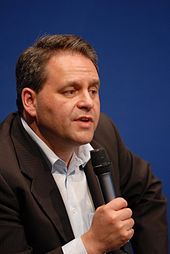Xavier Bertrand
Xavier Bertrand (born March 21, 1965 in Châlons-sur-Marne , Département Marne ) is a French politician (formerly Les Républicains ) and has been President of the Regional Council of Hauts-de-France since 2016 .
From May 18, 2007 to January 15, 2009 he was Minister for Labor, Social Relations and Solidarity in the government of François Fillon , and from November 15, 2010 to May 16, 2012 he was again Minister for Labor, Employment and Health was appointed to the cabinet of Prime Minister François Fillon.
biography
In 1981, at the age of 16, Xavier Bertrand joined the conservative opposition party RPR - contrary to the “pink wave” that prevailed after François Mitterrand's election victory . After studying law, he first worked in insurance, but soon turned back to politics. On March 20, 1989 he was elected to the city council of Saint-Quentin ( Aisne department in Picardy ), became deputy mayor, remained a member of the city council until June 18, 1995, earned his first political laurels on the grassroots. From March 23, 1998 to July 29, 2002 he was a member of the Conseil général des Départements Aisne .
After the French presidential election in 2002 , Bertrand was elected to the National Assembly on June 16, 2002 on the "blue wave" as a candidate for the UMP . In the second ballot he prevailed with 56.96 percent of the votes cast against a candidate of the Parti socialiste .
In the following year, Alain Juppé commissioned him to organize a " Tour de France " ( Tour de France ), during which he was supposed to explain to the voters of Juppé's controversial pension reform. Performing this task increased Bertrand's standing and influence within the UMP.
In 2004, Bertrand was appointed State Secretary in the Ministry of Health in the Raffarin government. Under the leadership of (then) Minister of Health Philippe Douste-Blazy , he tackled the reform of health insurance.
When, after Raffarin's resignation, President Jacques Chirac entrusted Dominique de Villepin with the formation of a new government, Xavier Bertrand was appointed Minister of Health and Social Affairs. At the beginning of his mandate, he has to deal with a chikungunya epidemic on the island of Reunion Island and react to an incipient heat wave. He also enforced the smoking ban in public facilities.
On November 29, 2006, Bertrand announced that he would support Nicolas Sarkozy's candidacy for president and on January 15, 2007, he became the spokesman for the presidential election campaign. On March 26, 2007, Bertrand left the government in order to be able to devote himself entirely to Sarkozy's election campaign.
On May 18, 2007, he was appointed Minister for Labor, Social Relations and Solidarity in the François Fillon government. He held this post until the government reshuffle on January 15, 2009.
On December 5, 2008, Bertrand was initially provisional secrétaire général of the Union pour un mouvement populaire and officially elected to this office on January 24, 2009. After joining the Fillon government, he stepped down on November 17, 2010. He was succeeded by Jean-François Copé .
On November 15, 2010, he was reappointed to the government of Prime Minister François Fillon as Minister of Labor, Employment and Health . He resigned from this post with the appointment of the Ayrault government . Bertrand's political positions have changed so much over the years that he initially belonged to the right, Gaullist wing of the party, but today he is part of the liberal wing : In 1992, he led the campaign for a “No” in the French referendum on the Maastricht Treaty in 2005 On the other hand, he advocated a “yes” in the vote on the European Constitution - the side supported by Bertrand ultimately lost both times.
In the parliamentary elections in 2012 he was re-elected as a member of the Aisne department . He announced in 2012 that he would be running for the presidential election in 2017 , but ultimately decided not to run.
In the regional elections in France in 2015 , he was the top candidate of the center-right alliance in the newly created Hauts-de-France region, whose list received 25% of the vote in the first ballot. In the second ballot, the Parti socialiste withdrew its list in view of the impending election victory of the National Front and Bertrand's list received 57.8% of the vote in the second ballot.
In the 2017 presidential election, he initially supported François Fillon , but then unsuccessfully asked him, after he was charged with corruption, to withdraw his candidacy. After Emmanuel Macron's election victory , Bertrand, unlike his party colleague Édouard Philippe , rejected an offer from the newly elected president to become his prime minister. After he had previously expressed himself critical of the course of the party, which in his opinion tended too far to the right , he resigned from the party on December 11, 2017 in response to the election of Laurent Wauquiez as the new party leader.
Private life
Xavier Bertrand was married twice and has three children. For many years he was a member of the Freemasons Association , from which he resigned in 2012.
Web links
Individual evidence
- ↑ UMP: Xavier Bertrand sera bien candidat à la primaire en 2016. Le Parisien , October 13, 2013, accessed on September 4, 2015 (French).
- ^ Bertrand annonce son départ des Républicains après l'élection de Wauquiez. Le Figaro , December 11, 2017, accessed December 20, 2017 (French).
- ↑ Freemasons in France , Süddeutsche Zeitung of September 4, 2010 on the homepage of www.sueddeutsche.de (accessed on July 6, 2013)
| personal data | |
|---|---|
| SURNAME | Bertrand, Xavier |
| BRIEF DESCRIPTION | French politician (UMP), member of the National Assembly |
| DATE OF BIRTH | March 21, 1965 |
| PLACE OF BIRTH | Châlons-sur-Marne |

